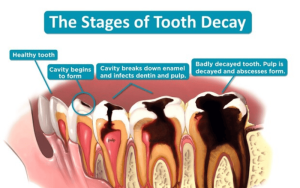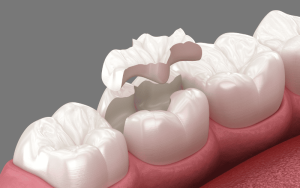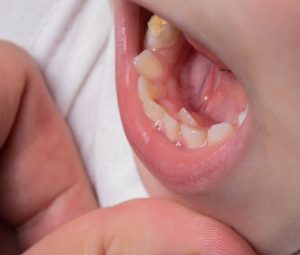Table of content
Gum swelling (gingival swelling) is a common dental condition that causes pain and is prone to bleeding when brushing or rubbing. If gum swelling is not treated early, it can lead to many other dangerous issues. So what are the causes of gum swelling and how can this condition be remedied? Let’s explore in the article below!
1. Recognizing the symptoms of gum swelling
Symptoms of gum swelling may vary from person to person, but the most common signs include:
- The gums change from light pink to dark red.
- The swollen gum area forms a pus-filled pocket, swelling the cheek or face and may cause bleeding.
- The patient experiences pain and discomfort when eating, leading to loss of appetite.
- Consuming spicy, salty, hot, or cold foods may cause irritation.
- Bad breath.
- The gum surrounding the tooth root tends to separate, causing the tooth to become slightly loose.
- In some cases, gum swelling accompanied by pus can also be associated with symptoms like fever, headache, and insomnia.
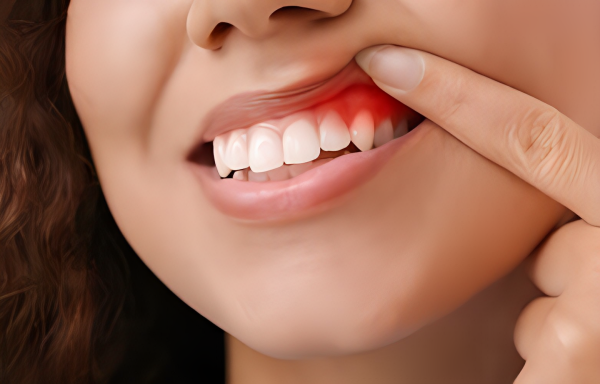
2. Investigating the “culprits” causing gum swelling
Gum swelling can stem from several causes:
2.1. Oral diseases
Oral diseases are one of the most common causes of tooth pain and swollen gums, specifically:
Gingivitis
This is the most common reason for swollen and bleeding gums, accompanied by symptoms like gum pain, receding gums, loose teeth, and more. If not treated promptly, gingivitis can lead to more serious conditions like periodontitis or tooth loss.
Periodontitis
This disease, caused by harmful bacteria invading the periodontal tissues, leads to gum inflammation and infection, causing swelling and pain. If periodontitis persists, it can result in loose teeth or tooth loss.
Infections
Infections caused by fungi or viruses, such as Herpes, yeast infections, or cavities, can also cause the gums to become swollen and red.
Dental Abscess
This is a dangerous infection that forms pus-filled pockets under the tooth root area. When you have a dental abscess, the gums swell with severe pain, and there may be bad odor in the mouth.
2.2. Wisdom teeth eruption
Gum swelling during wisdom tooth eruption is a common condition in many people. This happens because when a wisdom tooth erupts, the gum around the tooth root gets separated. During this time, food particles may get trapped in the gum, causing inflammation, pain, pus formation, and bad breath.
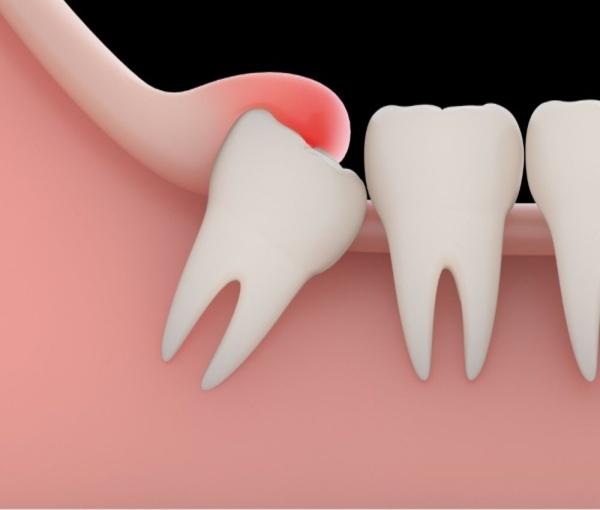
2.3. Poor oral hygiene
Improper oral hygiene can lead to plaque buildup between the teeth. This creates a favorable environment for bacteria to attack the tooth enamel, gradually breaking down the connection between the gums and teeth, leading to inflammation and swelling.
2.4. Nutrient deficiencies
Gum swelling can also be caused by poor nutrition, especially a deficiency in Vitamin B, C, which are essential for maintaining and recovering gum health. A lack of these nutrients can lead to Scurvy, with symptoms like swollen gums, bleeding gums, and more.
2.5. Other causes
Swollen gums can also result from other causes, including:
- Swollen gums during pregnancy.
- Swollen gums due to irritation.
- Swollen gums as a side effect of medication.
- Swollen gums due to complications of systemic diseases like diabetes or sepsis.
3. Can gum swelling go away on its own?
If the gum swelling is mild, it may go away on its own if you maintain good oral hygiene and a proper diet.
However, if the swelling is accompanied by pus, this is a serious condition that requires immediate medical attention to prevent damage to surrounding teeth. It is recommended to visit a reputable dental clinic with skilled doctors and modern equipment for safe and effective treatment.
Elite Dental is proud to be a trusted dental clinic chosen by many customers for the following strengths:
- Highly skilled doctors with extensive experience in treating dental issues, working with the motto “minimal invasion – maximum preservation of natural teeth.” When you visit Elite Dental, doctors will provide detailed consultations, carefully examine, and propose the most suitable treatment plan for you.
- Elite Dental invests in modern equipment and digital technologies that maximize the effectiveness and safety of dental examinations, diagnoses, and treatments.
- You can feel confident about Elite Dental thanks to reasonable and transparent pricing with no hidden fees during treatment.
- The clinic provides a spacious and comfortable environment, offering a pleasant dental experience. Additionally, Elite Dental has 3 locations in HCM City, making it convenient for your checkups and treatments.
4. How to quickly remedy swollen gums?
Here are some quick and effective ways to treat swollen gums at home:
4.1. How to reduce swollen gums at home
To treat swollen gums at home, you can do the following:
Careful brushing
You should brush your teeth at least twice a day and use dental floss regularly, especially after every meal.
Rinse with salt water
Salt helps prevent bacteria from growing in the mouth and effectively reduces gum swelling. Rinse your gums with diluted salt water after brushing and rinse again with warm water. Do this 3 times a week to significantly reduce swelling.
Warm/cold compress
When the gums are swollen and painful, apply a warm towel to the affected area. Then replace it with a cold compress, repeating the hot-cold cycle 2-3 times to improve the swelling and pain.
Use hydrogen peroxide
You can rinse your mouth with a 3% hydrogen peroxide solution to relieve the pain caused by swollen gums.
4.2. Medical intervention
For severe gum swelling lasting more than 2 weeks, the doctor will prescribe an appropriate treatment. Some treatments for swollen gums include antibiotics, scaling, abscess drainage, minor surgery to remove foreign objects, tooth extraction, etc. To ensure an accurate diagnosis and effective medical intervention, patients should choose a reputable and quality dental clinic.

5. Elite Dental’s advice to prevent swollen gums
In addition to treatment, preventing gum swelling is also very important. Here are some preventive measures you should implement early:
- Brush your teeth twice a day, gently, and use dental floss.
- Visit the dentist for regular checkups every 6 months to clean and examine your teeth and gums.
- Limit smoking and excessive alcohol consumption.
- Ensure sufficient Vitamin C intake through food or supplements to maintain and restore gum health.
- Massage your gums gently to increase blood circulation to the gum area, reducing the risk of tooth pain.
The article above helps you understand the causes and treatments for swollen gums. To avoid dangerous complications from this condition, whenever you notice symptoms of swollen gums, seek care at a reputable dental clinic to get safe and effective treatment.


